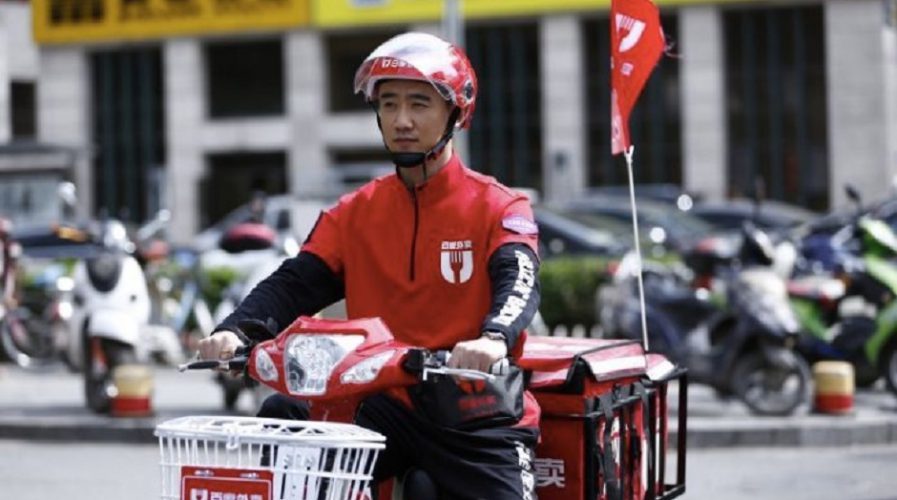
(File) A delivery driver for Baidu Waimai’s food service. Source: LinkedIn
What’s behind Alibaba’s Ele.me acquisition of Baidu’s Waimai?
ELE.ME, Alibaba’s food delivery arm and a huge player in China’s increasingly competitive food delivery sector, has bought over rival Baidu Inc.’s Waimai, marking the latest trend in the People’s Republic’s rapidly consolidating Internet market.
An unnamed source recently told China Daily that Ele.me would be acquiring Waimai for an estimated US$500 million deal.
Food delivery is a cutthroat industry that has bled many small players and yielded huge tie-ups between the divisions run by some of the biggest technology companies in China. Aside from Ele.me and Waimai, the sector is also dominated by Tencent-backed Meituan Dianping. These three companies bestride the hugely lucrative Chinese market where demand for fast, fresh deliveries has been climbing.
SEE ALSO: How technology, on-demand food delivery platforms can drive China’s dining culture
According to China Daily, Baidu Waimai will continue to operate as an independent entity from Ele.me, and will also keep its current operations team, though aspects of its financial structure remain unanswered. Baidu Waimai, which controls the smallest portion of total market share out of the three, has long been rumored to be struggling in the Chinese food delivery market, and could potentially be a huge capital drain on parent company Baidu, who isn’t exactly thriving either.
“The online food delivery sector had not been Baidu’s core business since the second half of last year as Baidu CEO Robin Li put more emphasis on AI,” said Yang Xu, an analyst at Beijing-based internet consultancy Analysys, to China Daily.
Ele.me swallows up Baidu Waimai https://t.co/8pqe6VtqjP pic.twitter.com/5jbeIop6KL
— China.org.cn (@chinaorgcn) August 25, 2017
Last December, according to China Daily, Ele.me and Baidu Waimai controlled 36.5 percent and 17.3 percent of the total market share respectively, while Meituan had 33 percent. A tie-up between Ele.me and Baidu Waimai would give the Alibaba-backed service an upper hand in the industry, essentially making it the market leader.
If you know anything about the relationships between Baidu, Tencent and Alibaba, you might be surprised to hear they’re even agreeing to work together, despite frosty relations all around.
However, Esme Pau of retail and technology research house Fung Global says this isn’t at all surprising.
“We think Baidu’s disposal of its food delivery operations is well expected, as it has been reported in Chinese media that discussions were ongoing,” she told Tech Wire Asia.
“We think the competition between Ele.me and Meituan will intensify after the acquisition for China’s food delivery market.”
“Food delivery is similar to bike sharing and other online-to-offline (O2O) services that are undergoing consolidation. We think it is likely that the two incumbents will give out more cash subsidies, which end consumers would benefit from.”
The O2O industry has been facing intense competition since the rise of these Internet startups. The term, coined by Alibaba’s Jack Ma, refers to the use of e-commerce tools to optimize the possibilities of brick-and-mortar outlets. Aside from market share, what Ele.me – and, to a greater extent, Alibaba as a whole – would stand to gain from its purchase of Baidu Waimai is the latter’s consumer data.
SEE ALSO: China: Food delivery startup Ele.me to gain $1b investment from Alibaba
Data forms the backbone of many Internet businesses and drives their ability to optimize their marketing and sales efforts more effectively to onboard new customers. Alibaba has been steadily growing their data networks in various countries all over the world, especially in Asia. At the heart of Alibaba’s data infrastructure is its market dominant Taobao and e-commerce platforms, which are steadily feeding the company reams of information about consumer behavior.
The Baidu Waimai acquisition gets even more interesting when you consider the fact that Baidu has an incredibly sophisticated network of user information and data through its core Internet search and advertising business, some of which would presumably be fed into Waimai.
China Daily reported that Ele.me would be paying Baidu US$300 million for access to other services, such as Baidu Maps, Baidu Search, and group-buying service Baidu Nuomi, all of which would likely yield rich opportunities to enhance user experience.
Another dimension to this story is the great war being fought between Tencent and Alibaba, both of whom are each other’s biggest rivals. Sour relations exist between Alibaba and Meituan, who once counted the former as a central ally and huge investor – up until Meituan took a big hit of investment cash from Tencent.
Undoubtedly, Alibaba is stocking up its weapons in its long game to dominate the O2O sector.
READ MORE
- Ethical AI: The renewed importance of safeguarding data and customer privacy in Generative AI applications
- How Japan balances AI-driven opportunities with cybersecurity needs
- Deploying SASE: Benchmarking your approach
- Insurance everywhere all at once: the digital transformation of the APAC insurance industry
- Google parent Alphabet eyes HubSpot: A potential acquisition shaping the future of CRM
